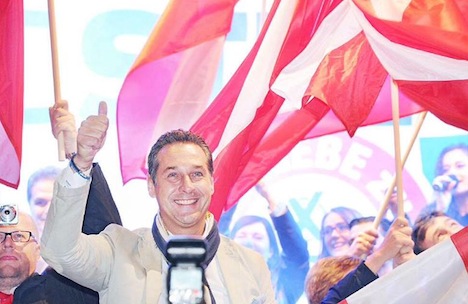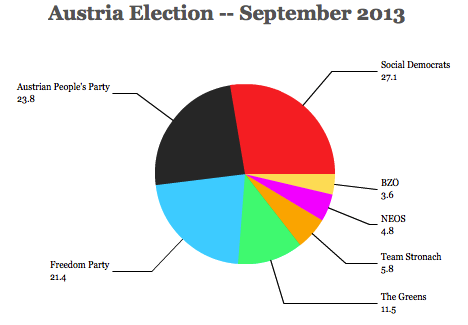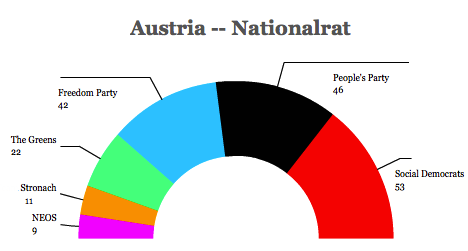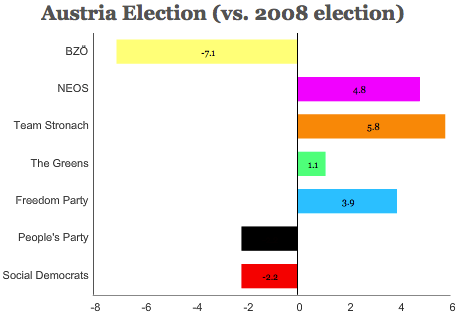With nearly all of the votes counted in Austria’s election today, it appears that the current grand coalition led by center-left chancellor Werner Faymann will continue — for up to another five years.![]()
Just one week after Germans massively supported chancellor Angela Merkel and her center-right Christian Democrats for steering Germany largely unscathed through the worst of the economic crisis, Austrians appeared ready to do the same for Faymann, though his Sozialdemokratische Partei Österreichs (SPÖ, Social Democratic Party of Austria) did not score the kind of overwhelming victory that Merkel’s Christian Democrats won last week — the SPÖ lost over 2% of the vote since the September 2008 election.
But their coalition partners, the center-right Österreichische Volkspartei (ÖVP, Austrian People’s Party), also lost 2.2% of the vote from 2008. Together, however, the two parties won enough seats (99) to continue to hold an absolute majority in Austria’s 183-member Nationalrat (National Council), the chief house of the Austrian parliament.
But the far-right, anti-EU, anti-immigrant Freiheitliche Partei Österreichs (FPÖ, the Freedom Party of Austria) won just four seats less than the People’s Party and it won over 21% of the vote. That’s largely because voters on the far right abandoned the Bündnis Zukunft Österreich (BZÖ, Alliance for the Future of Austria), the splinter group that former Freedom Party leader Jörg Haider founded in 2005.
Believe it or not, today’s election was the first one without Haider in nearly two decades following his sensational death in October 2008, and the BZÖ lost over 7% from the 2008 election — and missed the 4% electoral hurdle required to hold seats in Austria’s National Council. Given Haider’s absence from the political scene, many BZÖ supporters turned back to the Freedom Party. In any event, it’s certainly a huge victory for FPÖ leader Heinz-Christian Strache (pictured above), whose party gained more support than any of the parties that contested the 2008 election. Strache is one of the big winners in today’s election, and that will amplify his voice as the chief opposition leader in Austria.
Together, the People’s Party and the Freedom Party hold nearly enough seats to form a government of their own (88 — four short of a majority), though they would need the support of one of Austria’s two newest parties to govern, and there’s no indication that ÖVP leader and foreign minister Michael Spindelegger was interested in trying to build an unstable right-wing coalition.
Another big winner in today’s vote is a relatively new party, comprised of smaller free-market liberal groups, Das Neue Österreich (NEOS, The New Austria). The NEOS won 4.8% of the vote and are expected to hold nine seats in the National Council. It’s the first Austrian election since 1994 in which a liberal party won enough seats to enter the National Council, ironically just a week after Germany’s more established liberal party, the Free Democrats, failed to win enough support to return to Germany’s Bundestag.
The eurosceptic Team Stronach, founded last year by Canadian businessman Frank Stronach, finished with just 5.8% of the vote, enough to win 11 seats in the National Council. But the result will be something of a disappointment given the excitement that met with Stronach’s return to Austria — polls showed the new party winning between 10% and 11% last autumn.



